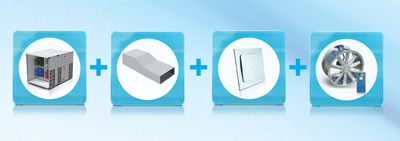A new and more flexible Variable Air Volume (VAV) system is
helping consultants and contractors take the next step in HVAC
system efficiency whilst having the potential to save on capital costs.
For the past 30 years VAV systems have been the preferred air
distribution method. Traditionally these have incorporated an
Air Handling Unit or Fan Coil Unit with AC fans connected to a
high-pressure duct network that delivers air through an inefficient
VAV box with a fixed geometry diffuser. EC fans have helped to
improve the energy efficiency, but the system remains moderately
efficient and is limited in that it cannot be adapted to system
layout changes and has the potential for noise issues.
Fantech has addressed these shortcomings and developed a
fully integrated VAV system known as AirLink. By utilising multiple
technologies and Static Regain Duct Design, AirLink minimises
energy consumption and delivers a more efficient, more adaptive
air distribution solution to help create a comfortable indoor
space. Capable of precise air delivery to every room, this flexible
VAV solution is easy to re-zone
and changes to the system layout
can be made quickly if required.
When ducting is designed with
the Static Regain method a
capital saving is achievable in almost all cases. Independent
analysis that supports this has been produced based on a range
of different buildings in Australia.

The AirLink VAV system includes four key components:
- Air Design Air Handling/Fan Coil Units, fitted with highly
advanced single or multiple energy saving EC fans that can
deliver the full range of air flows with maximum efficiency.
- Rickard electronic Variable Air Volume (VAV) diffusers.
These are intelligent modular systems that can be zoned
into independently controlled comfort areas and significantly
reduce power consumption of the air handling system.
- Fantech adjustable pitch axial fans. They incorporate high performance impeller blades that harness the latest design
technologies to deliver enhanced pressure development, energy efficiency and reduced noise levels.
- A low-pressure duct system utilising static regain to ensure even pressure across the diffusers and reduce
commissioning time as the duct design is self-balancing.
This integrated system is very effective in applications where
the occupancy level and conditions vary during the day. The
ventilation rate automatically adjusts to meet these changing
requirements of the area, minimising energy consumption while
helping to maintain a healthy and productive environment. The
extensive range of sizes for each component make the AirLink
system suitable for a vast range of commercial buildings,
including schools and universities, hospitals, convention centres
and office blocks.





